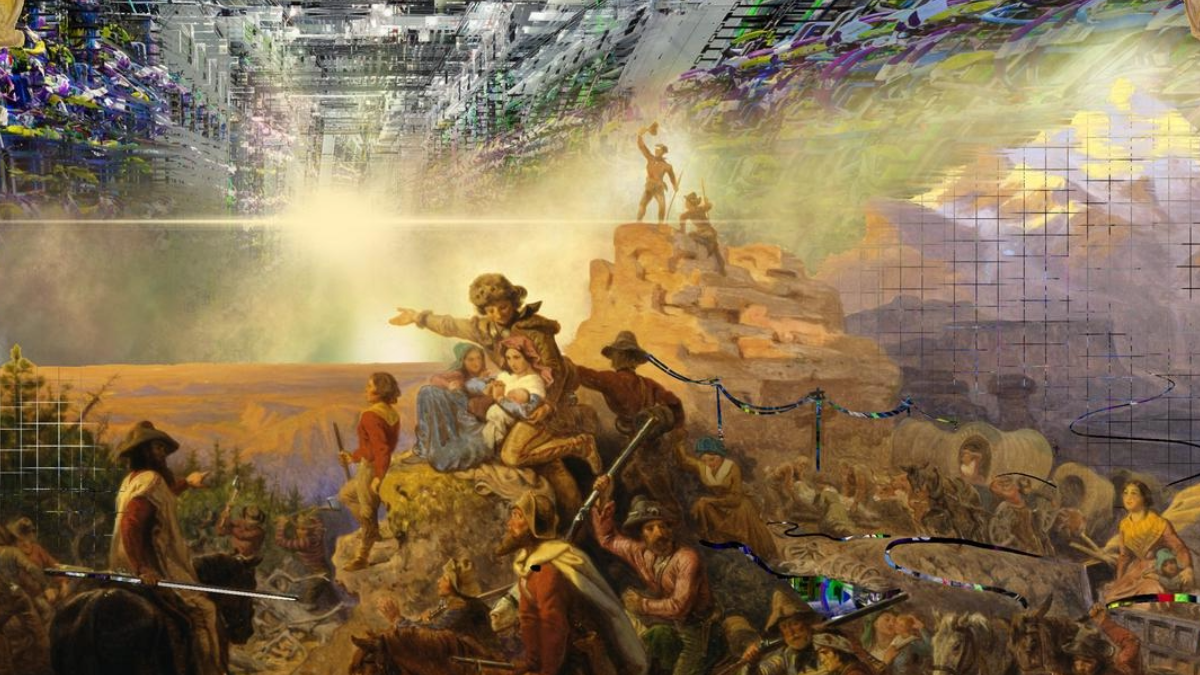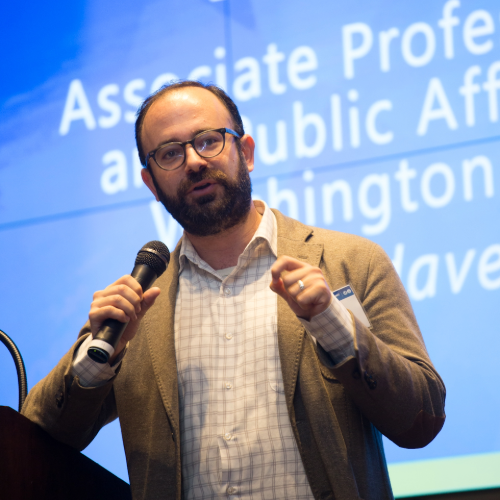Peter Thiel Dreams of Empire
Dave Karpf / Jan 17, 2025
Hanna Barakat + AIxDESIGN & Archival Images of AI / Better Images of AI / Frontier Models 3 / CC-BY 4.0
Perhaps the most famous piece of lore from the early days of the “PayPal mafia” is the time that Elon Musk took Peter Thiel for a joyride in his McLaren F1. Thiel asked Musk what the car could do. Musk said, “Watch this,” gunned the engine, lost control of the car, hit an embankment, and the car went airborne. The two men survived without injury, but the car itself was ruined. Musk, in his own words, “didn’t really know how to drive.” He also hadn’t bothered to insure the million-dollar vehicle.
That story happened almost 25 years ago, but it still offers a lesson for us today: Beware of tech barons and their newly purchased toys.
Musk and Thiel’s latest acquisition is, effectively, the United States government. Musk spent over $250 million in support of President-elect Donald Trump’s election effort. He has been glued to Trump’s hip ever since the election and has been tasked as cochair of the “Department of Governmental Efficiency” (DOGE/not an actual department of anything). with overhauling the entire federal bureaucracy to suit his personal whims. And JD Vance, the incoming Vice President, is a longtime Thiel protégé.
Last week, Thiel contributed a column to the Financial Times titled “A time for truth and reconciliation.” It’s a ludicrous, portentous piece of writing. But it also signals what Thiel thinks the US government can do if they really put the pedal to the metal and take it for a spin.
The column has been roundly mocked. Within the first three paragraphs, Thiel offers conspiratorial musings on everything from Jeffrey Epstein to the origins of COVID-19 to (I kid you not) who really assassinated John F. Kennedy in 1963. The essay reads like he took a normal piece of writing and asked ChatGPT for a rewrite that sounded more like the author has a remarkable collection of tin-foil hats.
All of that conspiracy-mongering, though, is intended to build a case for a new era of transparency, in which the Trump administration launches nonstop investigations into the evils and transgressions of its predecessors.
The key passage appears halfway through the piece, when Thiel writes:
Can we believe that a Brazilian judge banned X without American backing, in a tragicomic perversion of the Monroe Doctrine? Were we complicit in Australia’s recent legislation requiring age verification for social media users, the beginning of the end of internet anonymity? (…) We may expect no better from Orwellian dictatorships in East Asia and Eurasia, but we must support a free internet in Oceania.
Yes, we can, in fact, believe that a Brazilian judge acted against Elon Musk’s X without “American backing.” Supporters of Brazil’s former President Jair Bolsonaro plotted to overthrow the government in 2022. The Brazilian court demanded access to the organizers’ social media accounts. Musk’s X (which often cooperates when authoritarian governments make these sorts of demands) decided to stand up for the privacy of its users, and it led to a standoff between Musk and a Brazilian Supreme Court Justice.
There are principled reasons to defend Brazilians’ right to privacy in this case. There are also principled reasons why a government would choose to take the aftermath of an attempted coup very seriously. But Thiel is calling for something else entirely. He wants a government commission that can manufacture evidence that the whole episode was some sort of proxy battle in the fight between the Biden Administration and Big Tech.
The implicit model for Thiel’s “truth and reconciliation” proposal isn’t actually post-apartheid South Africa; it’s Rep. Jim Jordan’s (R-OH) multi-year crusade against misinformation researchers and trust & safety professionals. Rep Jordan used his political power to invite a narrative about Hunter Biden’s laptop in which routine interactions between federal agencies, academic researchers, and content moderation professionals became prima facie evidence of a vast and influential conspiracy. It produced no meaningful truth and fostered no reconciliation. That was never its purpose. Rep. Jordan set out to wield political power to benefit his allies and harm his opponents.
Thiel is developing a blueprint for putting Big Tech’s policy agenda at the center of US foreign policy. Australia’s social media ban is bad for American social media companies. The European Union’s Digital Services Act and Digital Markets Act impose regulatory requirements on very large online platforms that operate within the EU. Peter Thiel expects the US government to do something about that, in the guise of investigating and redressing past wrongdoings.
Tech billionaires like Thiel simply do not believe that their companies and investments should be beholden to governments. And now that they have control of the US government, they are suggesting that, if any other countries interfere with their business, the US government ought to intervene on their behalf.
Meta founder and CEO Mark Zuckerberg made similar comments last week, stating that he was looking forward to working with President Trump “to push back on governments around the world going after American companies and pushing to censor more. (…) Europe has an ever increasing number of laws institutionalizing censorship and making it difficult to build anything innovative there.”
(And it’s no coincidence that the two tech billionaires sound similar. Peter Thiel’s vast fortune comes from having been Zuckerberg’s first investor. He served over a dozen years on Facebook’s Board of Directors. The Silicon Valley power elite is small and insular enough to fit in a groupchat.)
Peter Thiel has never believed in transparency in any sort of principled way. We know this, of course, because Thiel waged a multi-year vendetta against Gawker, funding other people’s lawsuits and only revealing his role after he successfully bankrupted the outlet. His company, Palantir, is a major government contractor that specializes in surveillance and pattern analysis. Transparency, for Thiel, is a weapon to be deployed, not a principle to be applied in an evenhanded manner.
Peter Thiel and Elon Musk have effectively seized control of the US government now. The message we ought to take from Thiel’s latest public missive is that he is nothing if not a sore winner. Make no mistake: his next goal is to deploy the capacities of the US government to bring every other democracy that dares to stand up to the members of his groupchat to heel.
Beware of tech barons and their newly purchased toys. They tend to drive them over the railing without insurance.
Authors
